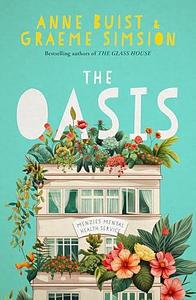Take a photo of a barcode or cover
challenging
emotional
funny
hopeful
medium-paced
Plot or Character Driven:
Character
Strong character development:
Yes
Loveable characters:
Yes
Diverse cast of characters:
Yes
Flaws of characters a main focus:
Yes
challenging
emotional
informative
reflective
medium-paced
Plot or Character Driven:
A mix
Strong character development:
Yes
Loveable characters:
Complicated
Diverse cast of characters:
Yes
Flaws of characters a main focus:
Yes
fast-paced
Plot or Character Driven:
A mix
Strong character development:
Complicated
Loveable characters:
Complicated
Diverse cast of characters:
Yes
Flaws of characters a main focus:
Complicated
challenging
informative
reflective
medium-paced
Plot or Character Driven:
Character
Strong character development:
Yes
Loveable characters:
Yes
Diverse cast of characters:
Yes
Flaws of characters a main focus:
Yes
emotional
reflective
medium-paced
Plot or Character Driven:
Character
Strong character development:
Complicated
Loveable characters:
Complicated
Diverse cast of characters:
Yes
Flaws of characters a main focus:
Yes
emotional
informative
reflective
medium-paced
Plot or Character Driven:
Character
challenging
emotional
reflective
fast-paced
Plot or Character Driven:
A mix
Strong character development:
Yes
Loveable characters:
Yes
Diverse cast of characters:
Yes
Flaws of characters a main focus:
Yes
challenging
emotional
funny
hopeful
informative
reflective
sad
medium-paced
Plot or Character Driven:
Character
Strong character development:
Complicated
Loveable characters:
Complicated
Diverse cast of characters:
Yes
Flaws of characters a main focus:
Yes
‘In a mental health service, ‘weird’ is normal, although we avoid both of those words when we’re talking about patients.’
This is the second book in the Menzies Mental Health series. Trainee psychiatrist Hannah Wright has moved from the acute ward at the Menzies Hospital to the outpatient clinic. Yes, there are plenty of challenges for Hannah to face, and not just in trying to meet the needs of a diverse set of patients. The medical hierarchy involves politics: managers are focussed on measuring inputs and outputs; one senior colleague has his own agenda and some of the supervising psychiatrists have different views about the values of talking therapies (which Hannah is keen to develop her own skills in) versus medication. Hannah herself is being strongly encouraged to seek therapy to address a traumatic past, and several of her colleagues are facing their own challenges.
The patients who visit the outpatient clinic have mental health issues including because of bad parenting, childhood abuse and ice addiction. Add genetic issues, OCD, schizoaffective disorder … and the challenges multiply.
I really enjoyed this novel and would strongly recommend reading the novels in order. Why? Partly because of character development but also because while the focus in the first novel is on acute mental health issues, this novel touches on issues, many of which are chronic and cannot be easily addressed. And, in touching on the issues Hannah and her colleagues face, the reader is reminded that mental health professionals are also fallible human beings.
As I wrote in my review of the first novel in this series, I read this novel as someone who has experienced two sides of mental health care. My brief experience as a student nurse introduced me to the complexities of care, while periods as an inpatient over a period of forty years have been both helpful and overwhelming.
The various stories unfold with compassion and humour and invite the reader to think about mental health issues.
Jennifer Cameron-Smith
challenging
emotional
hopeful
informative
medium-paced
Plot or Character Driven:
Character
Strong character development:
Yes
Loveable characters:
Complicated
Diverse cast of characters:
Yes
Flaws of characters a main focus:
Yes


